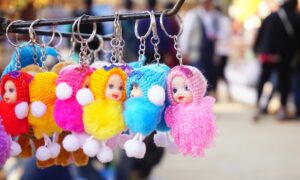Custom keychains are a popular and practical accessory that can serve as a stylish representation of personal taste or branding. Whether you are looking to create custom keychains for promotional purposes, as souvenirs, or for personal use, choosing the right material is crucial to ensure durability and style. This comprehensive guide will explore the best materials for custom keychains, examining their benefits, drawbacks, and aesthetic appeal.
- Metal Keychains
Stainless Steel
Durability:
Stainless steel is one of the most durable materials for keychains. It is resistant to rust, corrosion, and tarnish, making it ideal for everyday use.
Style:
Stainless steel keychains have a sleek and modern appearance. They can be polished to a high shine or given a brushed finish for a more understated look.
Customization:
Stainless steel can be easily engraved, etched, or printed on, allowing for a wide range of customization options.
Drawbacks:
Stainless steel keychains can be heavier than those made from other materials, which may not be desirable for everyone.
Aluminum
Durability:
Aluminum is lightweight yet strong, resistant to rust and corrosion. It is not as durable as stainless steel but still offers good longevity.
Style:
Aluminum keychains come in various colors and finishes, from shiny and polished to matte and anodized.
Customization:
Aluminum is easy to shape and engrave, making it a versatile choice for custom designs.
Drawbacks:
Aluminum can dent or scratch more easily than harder metals like stainless steel.
- Plastic Keychains
Acrylic
Durability:
Acrylic keychains are relatively durable and resistant to impact and weathering. However, they can be prone to scratching.
Style:
Acrylic offers a wide range of colors and can be transparent or opaque. It can be molded into various shapes and sizes, allowing for creative designs.
Customization:
Acrylic is highly customizable with options for printing, engraving, and embedding graphics or photos.
Drawbacks:
Acrylic can become brittle over time and may crack if subjected to heavy pressure.
PVC
Durability:
PVC (polyvinyl chloride) is a durable and flexible plastic material. It is resistant to water and most chemicals, making it suitable for outdoor use.
Style:
PVC keychains can be made in various colors and can include 3D designs, making them a fun and eye-catching option.
Customization:
PVC allows for intricate designs and can be molded into almost any shape. It is often used for character or logo keychains.
Drawbacks:
PVC keychains may not have the same premium feel as metal or leather keychains.
- Leather Keychains
Durability:
Leather is a durable material that can withstand daily wear and tear. It can develop a patina over time, adding to its aesthetic appeal.
Style:
Leather keychains exude a classic and timeless style. They can be dyed in various colors and finished with different textures, such as smooth, pebbled, or suede.
Customization:
Leather can be stamped, embossed, or printed with designs, logos, or text. It is also possible to add metal or stitched accents for additional customization.
Drawbacks:
Leather keychains require some maintenance to keep them looking their best and may not be suitable for vegans or those concerned with animal welfare.
- Wooden Keychains
Durability:
Wooden keychains are moderately durable, depending on the type of wood used. Hardwoods like oak or maple offer better longevity than softer woods.
Style:
Wooden keychains have a natural and rustic charm. They can be stained or painted in various colors and finishes.
Customization:
Wood can be laser-engraved or carved to create detailed designs. It is also possible to combine wood with other materials, such as metal or leather, for a unique look.
Drawbacks:
Wooden keychains can be susceptible to water damage and may not be as durable as metal or plastic options.
- Rubber Keychains
Durability:
Rubber keychains are highly durable and resistant to water, heat, and chemicals. They are flexible and can withstand rough handling.
Style:
Rubber keychains can be made in a variety of colors and shapes. They often have a soft, tactile feel that is appealing to many users.
Customization:
Rubber keychains are ideal for creating colorful and detailed designs, including 3D and multi-color options. They are often used for promotional items and novelty keychains.
Drawbacks:
Rubber keychains may not have the same premium look and feel as metal or leather keychains.
- Resin Keychains
Durability:
Resin keychains are durable and resistant to scratches and impacts. They can last a long time with proper care.
Style:
Resin offers a high level of clarity and can be colored, glittered, or embedded with objects or images, resulting in unique and eye-catching designs.
Customization:
Resin can be molded into various shapes and sizes. It is perfect for creating custom designs with intricate details and vibrant colors.
Drawbacks:
Resin keychains can be more time-consuming to produce, especially if they involve multiple layers or embedded objects.
Conclusion
Choosing the right material for custom keychains depends on the intended use, desired aesthetic, and budget. Metals like stainless steel and aluminum offer durability and a sleek look, while plastics like acrylic and PVC provide flexibility and vibrant colors. Leather and wood bring a natural and timeless appeal, while rubber and resin allow for creative and detailed designs. By considering the benefits and drawbacks of each material, you can select the perfect option for your custom keychains, ensuring they are both durable and stylish.



































